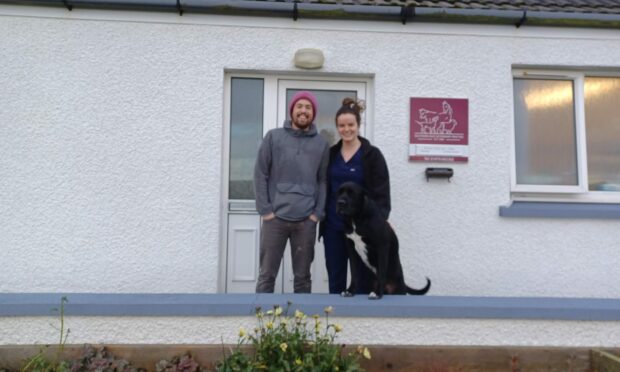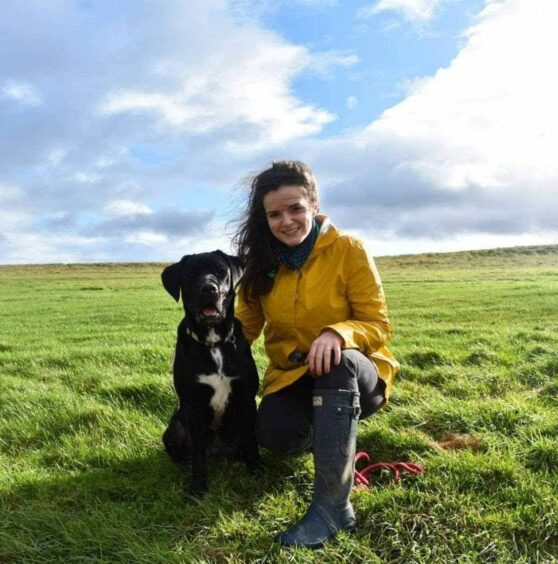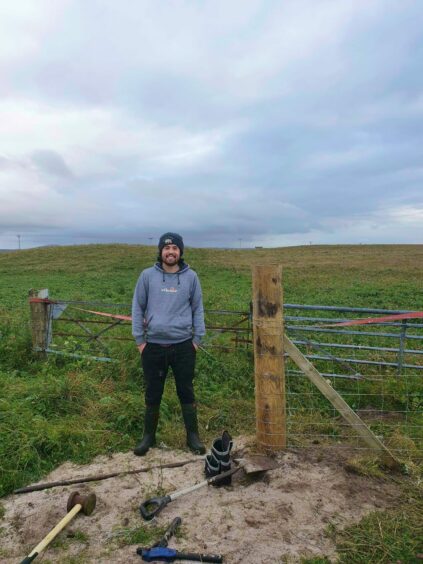Mainland universities were where Eva Troughton and Peter Buckland learnt to care for animals. Now, they’ve bought their skills back to their island home.
There’s no doubt that depopulation is one of the biggest challenges the Western Isles are facing today. But people leaving isn’t the whole story – and some versions can make the islands sound like a ghost town rather than the vibrant community it is. In this article, and others, we shine a light on some of the many different people who are choosing to build a life in the Outer Hebrides.
Eva Troughton and Peter Buckland are two of the many, many people who grew up in the Outer Hebrides but left to pursue higher education on the mainland.
The couple always had always wanted to return one day. But an opportunity to take over Southern Isles Veterinary Practice came sooner than they expected.
“I think you’ve just got to go for these hings,” says Ms Troughton.
Now – with Mr Buckland working as a vet and Ms Troughton in administration – they’re responsible for caring for Uist and Barra’s animals, treating everything from pets and livestock to seabirds and hedgehogs.
But moving back meant facing one of the biggest issues in the Hebrides: housing.
‘We were living out of suitcases’
Luckily, growing up on the islands meant that they had two families to stay with – but it was still far from ideal.
“We were split between our parents’ houses at first,” says Ms Troughton. “We were living out of suitcases.”
She acknowledges that the pair was “very lucky” to eventually find a place to rent.
“That was maybe four years ago, and I don’t think [the housing crisis] was quite as bad as it is now.”
Working at a vet practice in the Hebrides is very different than on the mainland, she says – in all the best ways.
“Here, you’re way more connected to people.”
“On the mainland they had so many customers that you didn’t get to know them unless they were really, really regular clients.”
For Mr Buckland, it’s the islands’ geography that makes the biggest difference.
‘Stressful, but rewarding’
On the mainland, there’s always the option of travelling to another practice. But, in Uist, often Southern Isles Veterinary Practice is “all that people have”.
“We get to do things that, on the mainland, you’d say ‘oh, that needs to be referred’.”
Taking on these challenges is, he says, “stressful, but also rewarding.”
Right now, the practice is busier than ever.
The number of people getting puppies and kittens “just went bang” during Covid, says Ms Troughton.
Currently, the practice has only two vets covering all of Uist and Barra. As demand grows, it’s becoming more and more obvious that they need another pair of hands.
But finding another vet is proving to be a big challenge.
‘A big dropout rate’
The lack of vets is a problem that the veterinary industry as a whole is facing, Ms Troughton says.
“There’s a big dropout rate.”
This is due, she says, to a combination of factors, such as a difficulty with “work-life balance” and “abuse” from some clients.
“Trying to get vets who are suited to living here is tricky,” she added , noting that, for many, it means a big distance between friends and family on the mainland.
One thing that would make a big difference, she says, is if they had accommodation they could promise – and so, it comes back around again to the housing crisis.
“We’ve been trying for a couple of years now to buy a place through the practice,” says Ms Troughton. She would love to be able to offer a flat or house to a permanent or locum vet.
Despite making several offers on properties “well over the asking price”, they’ve been turned down every time.
She described the process as “really gutting and deflating”.
But, even as they search for more help, the team is looking for ways to keep growing.
‘Slowly but surely trying to expand’
“We’re slowly but surely trying to expand and improve the practice,” she says.
Right now, this means transforming a storeroom into a new operating room and consult space.
“If there’s a sheep that needs to come in for a caesarean, or there’s a sick calf or something like that, we can have them in there.”
It will be a huge improvement on the outside pens they currently use for livestock, she says.
Additionally, a second operating room means that, if there’s an emergency, it will be able to be treated straight away even if one vet is already “knee-deep in an op.”
Rejuvenating the practice is a “slow process”, says Ms Troughton — “but once it’s done, it’s going to look great.”
For the couple, moving back and taking over Southern Isles Veterinary Practice hasn’t been without its challenges. But it’s been worth it to return to their island home.
‘Just like paradise’
A highlight for Mr Buckland has been being able to take up crofting, where he can raise his own sheep as well as looking after his neighbours’.
And for the “outdoorsy” Ms Troughton, the long summer nights are “just like paradise.”
The statistics of depopulation don’t lie. But Ms Troughton says she knows more and more people who are choosing to come back for good.
Out of her group of five close school friends, four are now back in Uist – and one is about to move to Lewis.
And “they’ve all got careers, families,” she says.
“They’re very much part of the community.”
More local reporting from the Western Isles:
- ‘A wee yarn in a warm place’: The busy opening week at the Western Isles’ first community fridge
- ‘We stayed up till midnight to get tickets!’: Cosplayers, superfans, and special guests on Stornoway’s first comics convention
- Finding a home in the Hebrides: The artist who came on holiday and never left




Conversation